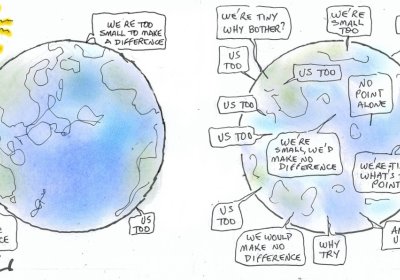Whichever major party claims government on May 18, neither can legitimately claim to have a mandate for its dangerously inadequate carbon emission reduction policies, writes Pip Hinman.
The Paris Agreement
The Scott Morrison government has made it clear it has no vision or desire to prepare Australia for the global energy future.
The federal Coalition government has dropped further in the polls following the knifing of former prime minister Malcolm Turnbull. Nevertheless, both new Prime Minister Scott Morrison and the hard right Peter Dutton/Tony Abbott faction in the Liberal Party seem determined to take politics even more to the right.
Renewable energy projects currently under construction in Queensland are set to create a comparable number of jobs to those of the controversial Adani new coal project, if it proceeds. The growth of renewable power generation will create more jobs than have been lost in coalmining.
It’s that time of year again when countries get together to discuss taking action on climate change. Progress is painfully slow at these United Nations Climate Change Conferences (known as COPs). We are up to number 23 — hence it is called COP23.
COP23, held in Bonn, Germany from November 6-17, is not as significant as COP21 in 2015, when the Paris Agreement was negotiated. Much of this year’s conference is concerned with fleshing out details of the Paris Agreement, the so called rulebook, for adoption in 2018.
Despite the overwhelming evidence that fossil fuels are killing the Great Barrier Reef and making many extreme weather events worse; despite the emphatic thumbs-down from the f
The news that a trillion ton piece of ice just broke off from the Larsen-C ice shelf on the Antarctic Peninsula is a reminder that global warming is real and dangerous.
While climate scientists say this had been expected, they also say it is connected to global warming. As ice shelves help keep land ice in place, when one breaks it allows land ice to slip into the ocean and drastically contribute to sea level rise.
For years climate scientists have been warning that time is fast running out to stop the worst effects of global warming.
Withdrawing from the United Nations Paris Climate Accord is one of more than 100 electoral campaign promises that Donald Trump made. By delivering on that promise, the US joined Nicaragua and Syria, the only countries that did not sign the agreement.
Nicaragua’s decision to not sign was not due to any indifference or denialism of climate change. Rather, the Central American nation’s reason was the contrary. It was based on its view that the agreement was not enough to address the climate crisis. Syria is in the middle of civil war and under US and European sanctions.
With the passage of the Climate Change Act (CCA) that mandates a target of zero net emissions by 2050, Victoria is formally in the leadership among state and federal governments.
[Ross Garnaut is a Professor of Economics at the Australian National University. In 2007 he was appointed to examine the impacts of climate change on the Australian economy and recommend medium to long-term policies and policy frameworks to improve the prospects for sustainable prosperity. The Garnaut Climate Change Review was finalised on September 30, 2008, with an update released on May 31, 2011. This is a speech given by Garnaut to the renewable energy summit hosted by the South Australian government on October 6.]
* * *
Fossil fuel divestment is gathering pace around Australia and the world. More and more individuals and organisations are pulling their investment assets out of companies involved with the exploration, extraction, production or financing of fossil fuels.
- Previous page
- Page 2











